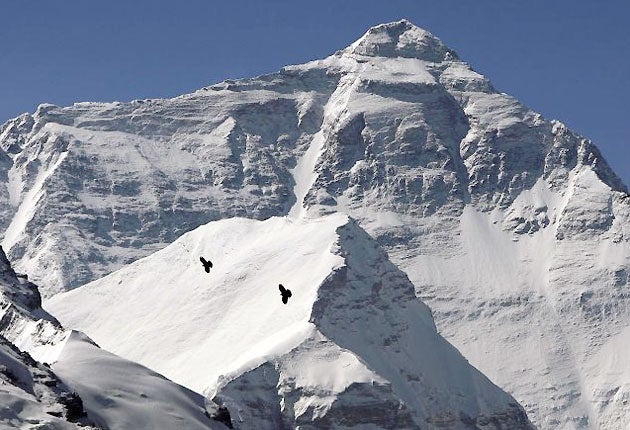Everest, the mountain with a little bit extra

Your support helps us to tell the story
From reproductive rights to climate change to Big Tech, The Independent is on the ground when the story is developing. Whether it's investigating the financials of Elon Musk's pro-Trump PAC or producing our latest documentary, 'The A Word', which shines a light on the American women fighting for reproductive rights, we know how important it is to parse out the facts from the messaging.
At such a critical moment in US history, we need reporters on the ground. Your donation allows us to keep sending journalists to speak to both sides of the story.
The Independent is trusted by Americans across the entire political spectrum. And unlike many other quality news outlets, we choose not to lock Americans out of our reporting and analysis with paywalls. We believe quality journalism should be available to everyone, paid for by those who can afford it.
Your support makes all the difference.Nepal and China have agreed to recognise the snow and rock heights of Mount Everest, ending a long-standing debate about the height of the world's tallest mountain, officials said today.
More than 4,000 climbers have scaled the mountain that straddles the Nepal-China border since it was first summited by New Zealander Sir Edmund Hillary and Tenzing Norgay Sherpa in May 1953.
But its exact height has remained a matter of debate.
The official Everest snow height of 8,848 metres (29,028 feet) was measured by the Survey of India in 1954.
Chinese mountaineers and researchers climbed Mount Everest in May 2005 to determine its height afresh and concluded that the rock height of the peak was about 3.7 metres (11 feet) less than the estimates made in 1954, or the summit was 8,844.43 metres (29,017 feet), with a margin of error of about 0.21 metres.
Officials from China and Nepal who met this week said both heights were accurate.
"Both are correct heights. No measurement is absolute. This is a problem of scientific research," said Raja Ram Chhatkuli, director general of Nepal's survey department, and a delegate.
Eight of the world's 14 tallest peaks including Mount Everest are in Nepal or on its borders with China and India.
In 1999, an expedition by the National Geographic Society and Boston's Museum of Science used satellite-based technology to measure the height of the snow covered peak, and determined the mountain stood 8,850 metres (29,035 feet) high.
They said they were unsure about the height of the rock peak.
Nepal has stuck to the snow height determined in 1954.
Some recent climbers say the mountain's glaciers are shrinking and portions of the trail leading to the summit are losing snow and turning rocky due to climate change.
Subscribe to Independent Premium to bookmark this article
Want to bookmark your favourite articles and stories to read or reference later? Start your Independent Premium subscription today.
Join our commenting forum
Join thought-provoking conversations, follow other Independent readers and see their replies
Comments